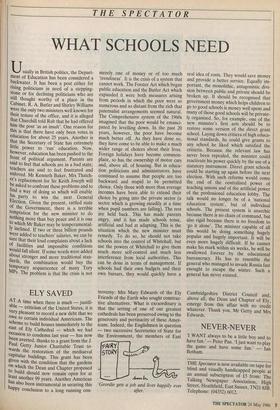THE SPECTATOR
WHAT SCHOOLS NEED
Usually in British politics, the Depart- ment of Education has been considered a backwater. It has been a post either for rising politicians in need of a stepping- stone or for declining politicians who are still thought worthy of a place in the Cabinet. R. A. Butler and Shirley Williams were the only two ministers well known for their tenure of the office, and it is alleged that Churchill told Rab that he had offered him the post 'as an insult'. One reason for this is that there have only been votes in education for about 25 years. Another is that the Secretary of State has extremely little power to 'run' education. Now, however, education has been pushed to the front of political argument. Parents are said to feel that schools are in a bad state; teachers are said to feel frustrated and unloved. Mr Kenneth Baker, Mrs Thatch- er's replacement for Sir Keith Joseph will be asked to confront these problems and to find a way of doing so which will enable his party to win the next General Election. Given the present, rattled state of the Government, there is a terrible temptation for the new minister to do nothing more than buy peace and it is one to which Mr Baker may be temperamental- ly inclined. If two or three billion pounds were added to teachers' salaries, we can be sure that their loud complaints about a lack of facilities and impossible conditions would fall silent. If some words were added about stronger and more traditional stan- dards, the combination would buy the temporary acquiescence of many Tory MPs. The problem is that the crisis is not merely one of money or of too much `trendiness'. It is the crisis of a system that cannot work. The Forster Act which began public education and the Butler Act which expanded it were both measures arising from periods in which the poor were so numerous and so distant from the rich that paternalist arrangements seemed natural. The Comprehensive system of the 1960s imagined that the poor would be emanci- pated by levelling down. In the past 20 years, however, the poor have become much better off. As they have done so, they have come to be able to make a much wider range of choices about their lives. Foreign holidays have become common- place, so has the ownership of motor cars and, above all, of housing. But in educa- tion politicians and administrators have continued to assume that people are too backward and stupid to be permitted choice. Only those with more than average incomes have been able to extend their choice by going into the private sector (a sector which is growing steadily at a time when pupil numbers are falling). The rest are held back. This has made parents angry, and it has made schools tense, artificial and bad at adapting. This is the situation which the new minister must remedy. To do so, he should not take schools into the control of Whitehall, but use the powers of Whitehall to give them much more self-control and much less interference from local authorities. This can be done in terms of management. If schools had their own budgets and their own bursars, they would quickly have a real idea of costs. They would save money and provide a better service. Equally im- portant, the monolithic, antagonistic divi- sion between public and private should be broken up. It should be recognised that government money which helps children to go to good schools is money well spent and many of those good schools will be private- ly organised. So, for example, one of the new minister's first acts should be to restore some version of the direct grant school. Laying down critiera of high educa- tional standards, he could give grants to any school he liked which satisfied the critieria. Because the relevant law has never been repealed, the minister could reactivate his power quickly by the use of a statutory instrument. Direct grant schools could be starting up again before the next election. With such reforms would come the end of the centralised power of teaching unions and of the artificial power of the professional education lobby. The talk would no longer be of a 'national education system', but of individual schools. The present system is anarchic because there is no chain of command, but also rigid because there is no freedom to `go it alone'. The minister capable of all this would be doing something hugely popular and hugely important. It will be even more hugely difficult. If he cannot make his mark within six weeks, he will be swallowed forever by the educational bureaucracy. He has to resemble the general who managed to invade Russia fast enought to escape the winter. Such a general has never existed.














































 Previous page
Previous page